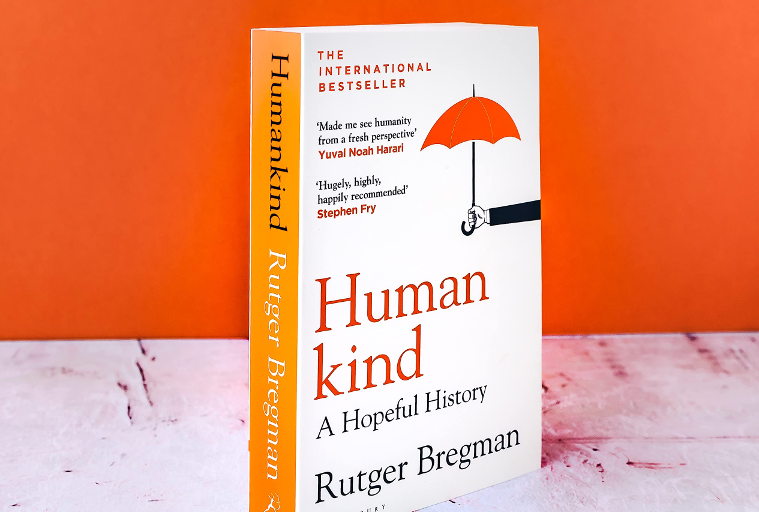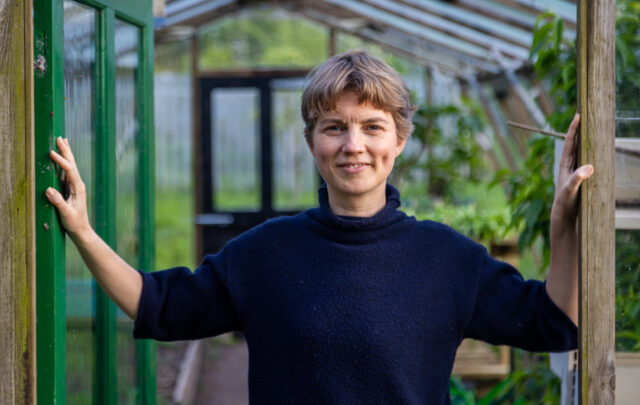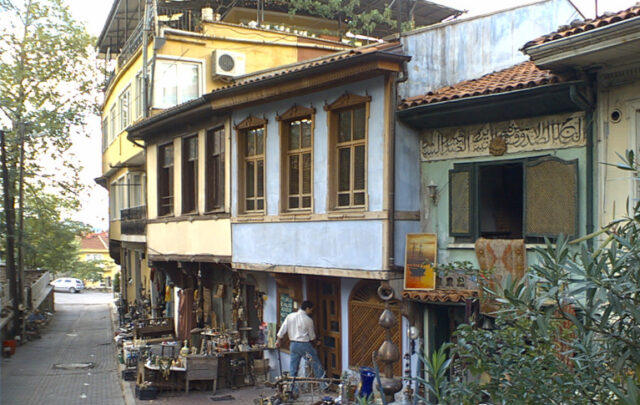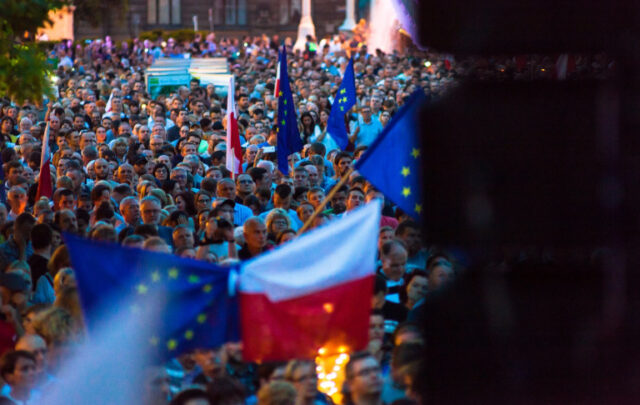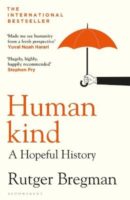 What a marvellous book! A powerful refutation of one of the most deeply entrenched and mistaken assumptions built into our taken-for-granted world view, and thus leading to many wrong-headed practices. For thousands of years almost everyone has believed that human nature is nasty, that we are basically selfish, competitive, aggressive and prone to violence, and that civilisation is a “thin veneer” that restrains us but is easily fractured. Just look at our history and at the world today. Bregman contrasts this Hobbesian view with that of Rousseau, who argued that our original nature was not like this and that it is “civilisation” that is causing the trouble.
What a marvellous book! A powerful refutation of one of the most deeply entrenched and mistaken assumptions built into our taken-for-granted world view, and thus leading to many wrong-headed practices. For thousands of years almost everyone has believed that human nature is nasty, that we are basically selfish, competitive, aggressive and prone to violence, and that civilisation is a “thin veneer” that restrains us but is easily fractured. Just look at our history and at the world today. Bregman contrasts this Hobbesian view with that of Rousseau, who argued that our original nature was not like this and that it is “civilisation” that is causing the trouble.
The book is a long and detailed examination of lots of evidence on related issues, with 53 pages of mostly scientific references. It is clear and written in an engaging style (although much too long.) And it is very convincing. The critiques I found do not dispute the validity of his main arguments.
He begins by demolishing the well known Lord of the Flies book by Golding, which shows how a group of boys stranded on a desert island descend into barbarism .. see, remove the restraining effect of civilisation and that’s what our nature is like. Well Bregman describes what actually happened when a group of boys were stranded on a Pacific island for many months. They got along jes fine, setting up a commune and working together to build shelter and collect food until they were found. One is still living in Queensland. When they had an argument the rule was for the parties to separate for some time, then come back and shake hands. When found they were in perfect health, despite one having healed from a broken leg incurred in a fall.
Bregman summaries the studies on what happens in disasters such as hurricanes, or accidents, when there are no authorities around to impose order. People typically jump into helping and cooperating to fix things. It is not the case that when the veneer of civilised order cracks a war of all against all breaks out. There follows some four hundred pages of analysis of similar situations and phenomena.
Bregman marvels at the way the negative assumption has dominated thinking for a least two thousand years.
“In almost every country most people believe that most other people cant be trusted.” (p. 12.)
He puts it terms of the clash between the Hobbesian ”veneer” view that the state of nature is nasty brutish and short, and thus that civilisation is a fragile shell over it and requires tight top-down rule or order will crumble, and Rousseau who argued that it is civilisation that is the problem, keeping humans “everywhere in chains” and that things were OK in the “state of nature” before civilisation was invented.
It’s not hard to find abundant instances of the unquestioned Hobbesian view throughout history…the Christian assumption of our “fallen” nature, especially savage in the punitive Calvinistic version still to be found in our schools, law, patriarchal families, prisons and work places. Much of the book presents cases where dumping the assumption leads to far better outcomes.
Bregman argues that what most characterises the human species is friendliness.
“… we are one of the friendliest species in the animal kingdom (p. 245.)
Many animals are very social, putting high value on being together, interacting, cooperating, grooming and playing, with obvious evolutionary significance, but humans are especially designed for convivial social interaction. We like being around others, being on good terms, helping and co-operating.
“Humans crave togetherness and interaction.” (p. 80.)
This he says is the major factor in the progress of our species, much more important than competition.
We have developed capacities to read and convey cues, such as smiling and eye contact. We seem to be unique in having whites in our eyes facilitating interpretation of eye movements which can indicate feelings and reactions. Above all we blush; and we are the only animal to do it. Blushing reveals concern about what the other thinks of us and about exposure of transgression, etc. It facilitates trust, because it helps us see how likely that the other is not being deceitful. These are all powerful group-bonding and law-abiding factors conducive to maintaining good relations with the other. Above all we, and many other animals, enjoy playing with each other. You have heard of Homo Ludens but Bregman calls us Homo Puppy.
He gives an interesting case for the origins of our puppy-like nature. It derives from his discussion of “domestication”. Domesticated animals have lost their wildness; they are mild, friendly and playful. He explains the study which bred 45 generations of Russian silver foxes in order to arrive at a variety more easily farmed. They are fiercely wild animals previously regarded as untameable. The researchers only selected for friendliness, and got it … dogs rather than foxes, eager to be patted and to play all day … but they also got a number of other characteristics associated with playful puppies, including puppy-like physical features, shorter shouts, floppy ears and males more like females. Darwin had puzzled why domesticated animals tend to be smaller, often floppy eared, and retaining juvenile characteristics through their lives. Bregman thinks a process like this associated with increasing domestication or friendliness might even have transformed our faces to be far more child-like than those of our Neanderthal and other relatives and for us to have become “smaller and cuter”. These kinds of characteristics seem to be by-products of selection for friendliness. In any case throughout the rest of the book he makes good use of this image of humans as having evolved to be friendly and playful, with powerful effects on the species subsequent capacity to succeed. Friendlier homo would have been better at communicating and cooperating. “Survival of the friendliest.”
From hunter-gatherers to the disaster that was civilisation
Hobbes and the rest of the pessimists think life was problematic until civilisation came along. Bregman goes over the established case that while civilisation has had its merits its coming was a disaster.
Much space is given to the way we humans lived for a very long time as hunter-gatherers. His account aligns with what seems to be the standard view now that these societies were very nice and friendly, not hierarchical or aggressive, providing a high level of freedom for children and women (who were usually able to terminate a partnership and form another as they wished … “serial monogamy”) and “allergic to inequality.” They shared everything and did everything together, in a group rather than as individuals, especially care of children. They had no taxes, bosses, states, religious domination, property or inheritance, and beyond infancy they probably had healthy long lives. Men spent a lot of time with children. Decisions “… were group affairs requiring long deliberation in which everybody got to have their say.” (p. 97.) One survey of 339 studies concluded that they are “… all but obsessively concerned with being free from the authority of others.”(p. 97.) They had mechanisms for preventing inequality and the rise of powerful individuals, especially use of shame. The successful hunter would say, and be told, that his meat is not much good.
“For hundreds of thousands of years we had efficient ways of taking down anyone who put on airs.” (p. 101.
He says they did not make war. In cave paintings from that era “ … there’s not a single depiction of war.” (p. 93.)
“How much archaeological evidence is there for early warfare, before the days of farming? … The answer is almost none.” (p. 93.)
Some three thousand skeletons have been found and the analysts “…see no convincing evidence for prehistoric warfare.” 93
But this is not what Pinker claims. He is famous for demonstrating that “…we started off nasty” (p. 80) and have been improving since. A feature of Bregman’s approach is his meticulous examination of theories, books and events usually assumed to reinforce the human-nature-is-evil and civilisation-is-fixing things view. He doesn’t spend much time on Pinker but does make some telling points, notably that most of the studies from which Pinker takes his statistics on violence and warfare are relatively recent and these groups have had a sad history of white aggression and plunder. The view now is that ”… most tribes still living the hunter-gatherer life today are not representative of how our ancestors lived.” (p. 89.) Fry’s re-examination of Pinker’s figures on the Paraguayan Ache found that all 46 cases claimed to be war dead were actually shot by slave traders et al. (p. 91.) Fry generalises; “…the nomadic hunter-gatherers avoid violence.” (p. 92.)
So premise one is at least highly challengeable; the state of nature seems distinctly not to have been nasty, brutish and short. Rousseau 1, Hobbs nil. Round two begins.
Then it just about all went wrong. Humans took up faming and Civilisation began.
“Rousseau saw the invention of farming as one big fiasco…” (p. 105.)
Diet deteriorated markedly and being confined in settlements close many other people and to animals led to poorer health. More work had to be done. Patriarchy began. Inequality, elites, kings and tyrants began. “The 1% began oppressing the 99%.” (p. 105.) Vindictive vengeful religion began. Previously the spirits were not very interested in humans and did not punish. A class arose to explain events, interpret the will of the gods and dictate correct behaviour. Storms etc. must have been sent by a god angry with us, so “For the first time in history, we developed a notion of sin.” (p. 107), and had to deal with a vengeful being and make sacrifices and do penance. With property to leave to offspring “… female virginity became an obsession.” And it seems debt began; the first evidence of writing we have recorded debts.
And it is here that war begins, evident in the first cave paintings of war, and in the kinds of skeleton injuries occurring.
“…the first archeological evidence for war suddenly appears 10,000 years ago.” (p. 200.)
Before that there would have been occasional scraps but Thomas, author of The Harmless People, says “…tribal wars would have been little more than name-calling.” …”if one or two warriors got injured the tribes usually called it a day.” Bregman comments, “See, noble savages.”
But that’s not the worst of it. The
“…final catastrophic event so lamented by Rousseau…(was) the birth of the state.” (p. 109.)
The villain (not discussed by Bregman) appears to have been grain, being easily accounted, stored, enabling rulers to assess and collect it as tax, and accumulate surpluses, which in turn made possible bureaucracies, state rule, armies, warfare and empires.
Bregman concludes,
“Civilisation has become synonymous with peace and progress, and wilderness with war and decline. In reality, for most of human existence, it was the other way around.” (p. 112.)
So, Rousseau 2, Hobbes still 0?
But if we’re so friendly, why so much warfare?
Bregman’s impressive (but insufficient; see below) answer is essentially … because we are so friendly. Again his case is good on evidence. Let’s start with, do soldiers fight wars because they are aggressive and want to kill? It’s pretty clear that in general they don’t. After the battle of Gettysberg 17,347 muskets were collected and it was found that 90% were loaded but not fired. (p. 84.) Colonel Marshall’s studies of World War 2 Pacific and European sites found that “…most of the soldiers didn’t fire their guns.” Only about 15% did fire them. Marshall thought this would have applied to “…all soldiers thoughout history”. (p. 84.) Crossman, another well-known researcher, found that “… most soldiers were not trying to kill the enemy” and most of the killing was carried out by a minority of soldiers. (p. 85.) Collins concludes his study,
“Humans are hard wired for solidarity; and this is what makes violence so difficult.” (p. 86.)
Bregman summarises the section;
“The average and normally healthy individual has such an inner … resistance towards killing a fellow man that he will not of his own volition take life.” “Most have a fear of aggression that is a normal part of our emotional make up.”
Why then do soldiers fight so hard? He says large studies have found that the answer is not ideology but the strong bonds between the men and the determination not to let comrades down. For example this stood out in 15,000 pages of transcripts of conversations overheard among German POWs, and also in studies among American soldiers. (p. 208) Fighting it seems is in fact due to … friendship.
“Comaraderie is the weapon that wins wars.” (p. 208.)
Regarding WW2 he says,
“Friendship, loyalty, solidarity…humanity’s best qualities …inspired millions of men to perpetrate the worst massacre in history.” (p. 209.)
This is a valuable insight, but in my view far from a sufficient explanation of our war-ridden history. It is an explanation of the behaviour of people who find themselves in the trenches, but how did they get there? He deals with this (too briefly) and in my view gets it partly right, in terms of the character and behaviour of rulers, elaborating on the “power corrupts” theme. Some try to get to the top of the heap, in corporations, armies and states. There is a strong tendency, as Macchiavelli saw, for this to require and result in …shamelessness, the readiness to contravene convivial social ways and restraints on power, without letting it worry them. The perspective and wishes of the other carry less and less weight. This is of course a loss of friendliness. Hunter gatherer societies had this power thing worked out; if an individual started getting too big for his boots, and was not responsive to the levelling mechanisms, especially shaming, and continued to boss and bully, then he would probably be killed by the group, with everyone contributing and thereby “ … sharing the responsibility for his death.” (p. 99.)
It is a pity Bregman does not pursue this further. Why do people allow their rulers to take so much power and get them into the trenches in the first place. We anarchists want to know why do they go along with what the rulers decree, why do they let themselves be ruled at all, why don’t they rule themselves, as the original hunter-gatherer anarchists did? As I see it the answer to this is not to do with friendliness, but Bregman’s concept of ”mismatch” could throw some light on it.
He suspects that the nature we developed in the long hunter-gatherer era built into us some dispositions that do not fit us well for the conditions we experience now. Consider our liking for sugar, rarely encountered in the earlier era and therefore evolution did not need to build in any safeguards against over indulgence. But now that we live in conditions where sugar is so abundantly available our nature does not prevent us from getting into trouble with it. Civilisation involves so many unnatural behaviours that great discipline and conditioning is required to make it work. Freud’s Civilisation and its Discontents recognised the tragic conflict, and the repression and psychological problems that it produces. Perhaps mismatch partly explains the difficulties we are now having with tribalism, and our difficulty with notions like universal human rights. Perhaps we are so often ruled by sociopaths, narcissists and power gluttons because there is a mismatch between the ways hunter gatherers developed to deal with them and the uselessness of these in today’s circumstances.
The policy mistakes we therefore make
Bregman devotes the last half of the book to the ways the Hobbesian assumption leads us to do so many things the wrong way. “… we continually operate on a mistaken model of human nature.” (p. 251.) It tells us that humans are selfish, vicious, and untrustworthy, and therefore control, repression, correction, and punishment are necessary. He considers the resulting ways we organise corporations schools, prisons etc. Then he provides examples of practices based on contrary assumptions, such as the mayor of Torres, Brazil, who won an election and immediately abandoned central budgeting and gave the task to the many towns in the region, the Norwegian prison in which guards and prisoners were friends and shared the chores, cooking their own food cooperatively in kitchens containing big knives, the large Dutch health care agency functioning remarkably well without centralised bureaucracy but with a CEO who trusted his teams to run their divisions cooperatively, and the schools where kids do what they want to. He documents the stunning achievements, when relations are based on friendliness and trust. That doesn’t mean there are no problems, but it does mean things work much better. The monetary costs for operating the prison are double the national prison average, but when the savings in recidivism and damaged lives etc. are taken into account the net cost to the nation are way down. Add the quality of life benefits.
Bregman puts much of this in terms of a “nocebo “ effect. Placebos have positive effects because of the positive expectations they set up. When lab assistants and teachers are told this lot is bright you can guess what happens. So don’t be surprised at what happens when so much in our society is organised on the assumption that people can’t be trusted. This is the “nocebo” effect. Negative or pessimistic assumptions typically mean repressive control measures will be put in place, forcing people to conform against their will and to be resentful and unwilling. Bregman points to the predictable positive effects where the motivation is positive, intrinsic, most obviously in learning situations.
Above all the Hobbesian view tells us we need rulers. We are fallible, perverse and violent animals in need of control from above. How remarkable that a doctrine providing such clear proof of the legitimacy of the ruling class should be so indubitably accepted! As Marx noted, the ruling ideas are usually the ideas that suit the ruling class. Unfortunately he didn’t seem to realise that rule by socialist ruling classes is based on the same mistaken assumption as rule by the capitalist class; we still need to be ruled. Hunter-gatherers constitute a powerful case against socialism and for anarchism.
And consider an economic system based on the assumptions that humans are driven by selfishness and greed, and must be driven to work by fear of poverty and unemployment. One consequence of such a theory/doctrine is that there is no need to take into account in economic calculations and policies any consideration of morality, justice, the public good, the worker’s welfare, or social cohesion or environmental “externalities”, let alone the intrinsic motivation that could energise enjoyable production.
But does he get to the bottom of it?
Bregman seems to me to be powerfully correct, and his analysis has very valuable implications for policy at the personal and social levels. As noted, none of the assessments I have seen dispute his main claims. My concern is that in order to understand the mess the world is in we need to go further than he goes. The basic causal factors in our predicament are not well analysed primarily in terms of our good or bad human nature. They require attention to be focused on our faulty institutions, systems and culture, and what it is about us that allows them to persist.
Perhaps this is not Bregman’s mandate. Enough that he identifies and gets us around a monumental mistake about humans. Rousseau wins, OK? But that does not help us much in understanding why we are well along with destroying our civilisation and the planet. In my firm opinion we are not doing that because we are selfish and aggressive, we are doing it mainly because of a syndrome to do with being fickle, irrational, perverse, socially irresponsible. Sometimes we don’t attend to things we know we should think about or deal with, including now our own survival. And this is where Bregman’s mismatch notion comes back in. My article “Social Responsibility: The biggest problem of all”, grapples with this puzzling phenomenon. Why don’t we solve the many problems arising from our faulty social institutions, above all our economic system? Why have people put up with tyrants, stupid arrangements and rotten conditions for 10,000 years, when they could have quickly and easily got rid of them. As Gandhi said regarding the domination of India, “If the Indians only spat the British would drown.” The answer is primarily because too few of them are seriously interested in fixing their lousy systems.
Social responsibility requires capacity and desire to think in high level abstract terms, a long way from immediate personal experience. It’s one thing to think about how it feels to be unemployed, it’s another to think about the economic system that creates unemployment and about the possibility of eliminating it. It’s one thing to band together with the rest of the tribe to drive off the woolly mammoth that’s just stomped into the camp; we would be well prepared by our evolutionary history to take immediate and energetic action on such immediate problems. It’s a very different thing to figure out and do whatever is necessary to scrap capitalism. Such thinking and action was never required in the hunter-gatherer era.
This appears to be a good example of a mismatch between the ways and thinking built into human nature through the hunter-gatherer era, and the conditions we experience now. We are not well equipped to deal with problems and threats originating in our gigantic, complex, abstract, distant, long term, inscrutable, entrenched, bureaucratic systems and institutions. Most of us can barely cope with the immediate and everyday problems associated with getting to work and getting the kids to school. Only a few manage in addition to care about social issues, and they soon find that it is nigh impossible to do anything about them. So it’s tempting to focus on the immediate and turn to sport and the Kardashians. Meanwhile, without the hunter-gatherer’s levelling mechanisms the few unfriendly and shameless get to the top and run things to enrich themselves. They are the ones who start the wars.
Maybe we can get Bregman to tackle this aspect of human nature in his next book. Maybe it’s enough that he’s made such monumental contribution in this one.


